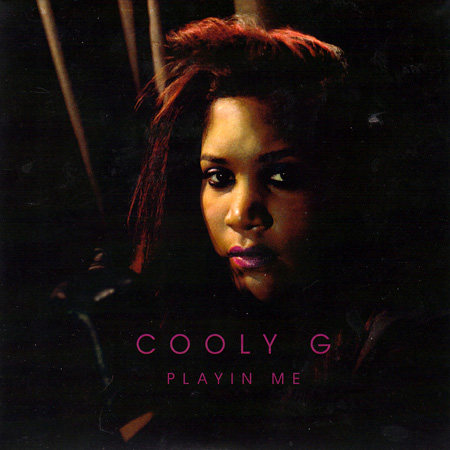Cooly G has been a presence on the front lines of Kode 9’s Hyperdub imprint since 2009, patenting a velveteen strain of UK funky with its heart affixed to chilly lounge aesthetics and hyperactive, garage-bent tribal flourishes. She immediately stuck way out in the same scene she simultaneously came to define. A habit of a few on the Hyperdub roster. So of course there’s a great deal of expectation going into her debut LP, Playin’ Me, but, at this point, what Hyperdub full-length doesn’t have the whole of UK bass on high alert, breath firmly held? The truth is, though, fifty minutes of Cooly G becomes more than just fifty minutes of Cooly G. Given more than two sides of a 12″, as has been her MO thus far, she’s able to sketch and carve out her own sonic world, affectively leaving her scene qualifications at the door to build something with a little lasting significance.
Still, viewing Playin’ Me with the expectations game in mind, Marissa Campnell lands squarely in the middle. The record is almost exactly as good as you might expect based on earlier material. The album format only allows Campbell’s downbeat Londoner atmospherics room to furl out into a runny, panoramic haze around the whole of Playin’ Me‘s runtime, giving its particulars depth and milage. Cooly G is still focused on lock-limbed percussion, effected sampling, and murmured, resolute vocals all tinged with a healthy dose of R&B and dub. But, as an album, Playin’ Me skews closer to records like Emika’s Emika and Nina Kraviz’s Nina Kraviz than it does to stuff with peered production specifics. All are atmospherically stark albums fronted by a female producer with a similarly sultry and disaffected, hyper-individual vocal aesthetic. Cooly G’s outlook is perhaps a little more grounded and specific and a little less lyrical than Emika’s or Kraviz’s, but all operate within outwardly constructed, introverted worlds of their own.
The album title refers to a feeling of romantic discontentment. If you take a look at the track titles it’s not hard to imagine a full romantic arc – one that ultimately ends in ruin. Opener “He Said I Said”, which proves to be one of the most vocal cuts on the record, starts at the beginning with Campbell admiring someone from afar. The track is a tangle of cut up bronzed funk chords and pattering, headlong percussion, synths condensing in tiny squiggles near its edges. The song builds and builds, never really finding a groove, settling for something a little more impressionistic. It’s fitting considering the emotional checkpoints hit with the subject matter, but it’s also what makes a lot of Playin’ Me interesting. The record is never straight-up ambient, but some of its most compelling material, on tracks like “Come Into My Room” or “Good Times,” is a loose assemblage of beats, synths, and organic instrumentation bleeding together like runny watercolors. Even on “Trying” and “Playin’ Me,” where percussion is employed throughout, the loops feel less programmed than they do bodily and organically derived, keeping in time with a rising heartbeat. The meditative and loosened approach adds weight and intimacy to the personal material Cooly G is exorcising here.
“Landscapes” and “Trouble” are a couple of other standouts that showcase a more familiar style. The former, though, might be Cooly G’s most sophisticated cut to date. Its dark foamy synths curl around some knobby-kneed rhythms, Campbell’s vocals slithering in atop a bed of watery textures. After the beat subsides for a good half-minute near the track’s center, it returns with a 4/4 stomp, the rest of the track building around its downward momentum. Otherwise, Playin’ Me has a few shaky moments (“Sunshrine”, “Is It Gone”), but it doubtlessly cements and reaffirms Cooly G as a significant force in UK bass and it shows the long-player format plays neatly to her sonic and conceptual sensibilities.

